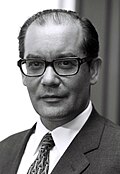President of the European Commission
head of government of the European Commission, the institution that holds the executive power of the European Union From Wikipedia, the free encyclopedia
The President of the European Commission is the head of the European Commission. It is the executive branch of the European Union. The President of the Commission leads a cabinet of Commissioners. The President is chosen by the Council and Parliament, and decides (with each country) who the other members are and what they do.
| President of the European Commission | |
|---|---|
 Emblem of the commission | |
 | |
| European Commission | |
| Style | President[1] |
| Status | Head of an Institution |
| Member of |
|
| Reports to |
|
| Residence | Berlaymont building |
| Seat | Brussels, Belgium |
| Nominator | European Council |
| Appointer | European Parliament |
| Term length | Five years, renewable |
| Constituting instrument | Treaties of the European Union |
| Formation | 1 January 1958 |
| First holder | Walter Hallstein |
| Deputy | First Vice-President of the European Commission |
| Salary | €306,655 annually[2] |
| Website | ec.europa.eu |
Background
The President of the Commission also represents the EU abroad, together with the President of the European Council and the High Representative of the Union for Foreign Affairs and Security Policy.
The post was established in 1958. Each new President is nominated by the European Council and formally elected by the European Parliament, for a five-year term.
The current President is Ursula von der Leyen, who took office on 1st December 2019. She is a member of the European People's Party (EPP) and is the former minister of defence of Germany.

List of presidents
Commission of the European Economic Community (1958–1967)
| Portrait | Name (birth–death) |
Term of office | Tenure | Commission | Party | Group | Country | ||
|---|---|---|---|---|---|---|---|---|---|
 |
Walter Hallstein (1901–1982) |
1 January 1958 | 5 July 1967 | 9 years, 185 days | Hallestein | CDU | CD | ||
Commission of the European Communities (1967–2009) and European Commission (2009–present)
- Parties
European People's Party ALDE Party/ELDR Party Party of European Socialists European Progressive Democrats
| Portrait | Name (birth–death) |
Term of office | Tenure | Commission | Party | Group | Country | Electoral mandate | ||
|---|---|---|---|---|---|---|---|---|---|---|
 |
Jean Rey (1902–1983) |
5 July 1967 | 1 July 1970 | 2 years, 361 days | Rey | PRL | LIB | – | ||
 |
Franco Maria Malfatti (1927–1991) |
1 July 1970 | 1 March 1972 | 1 year, 244 days | Malfatti | DC | CD | – | ||
 |
Sicco Mansholt (1908–1995) |
1 March 1972 | 5 January 1973 | 310 days | Mansholt | PvdA | SOC | – | ||
 |
François-Xavier Ortoli (1925–2007) |
5 January 1973 | 5 January 1977 | 4 years | Ortoli | UDR | EPD | – | ||
 |
Roy Jenkins (1920–2003) |
5 January 1977 | 19 January 1981 | 4 years, 14 days | Jenkins | Lab | SOC | 1979 | ||
 |
Gaston Thorn (1928–2007) |
19 January 1981 | 6 January 1985 | 3 years, 353 days | Thorn | DP | LD | |||
 |
Jacques Delors (1925–2023) |
6 January 1985 | 24 January 1995 | 10 years, 18 days | Delors | PS | SOC | 1984 1989 | ||
 |
Jacques Santer (born 1937) |
24 January 1995 | 15 March 1999[a] | 4 years, 50 days | Santer | CSV | EPP | 1994 | ||
 |
Manuel Marín (interim) (1949–2017) |
15 March 1999 | 17 September 1999 | 186 days | Santer | PSOE | SOC | |||
 |
Romano Prodi (born 1939) |
17 September 1999 | 22 November 2004 | 5 years, 66 days | Prodi | Dem | ELDR | 1999 | ||
 |
José Manuel Barroso (born 1956) |
22 November 2004 | 1 November 2014 | 9 years, 344 days | Barroso | PSD | EPP | 2004 2009 | ||
 |
Jean-Claude Juncker (born 1954) |
1 November 2014 | 30 November 2019 | 5 years, 29 days | Juncker | CSV | EPP | 2014 | ||
 |
Ursula von der Leyen (born 1958) |
1 December 2019 | Incumbent | 5 years, 115 days | von der Leyen | CDU | EPP | 2019 | ||
Notes
References
Other websites
Wikiwand - on
Seamless Wikipedia browsing. On steroids.

